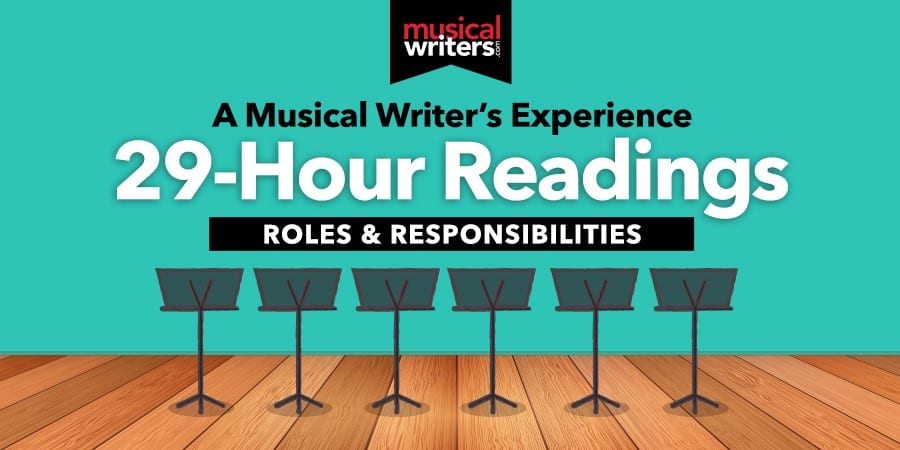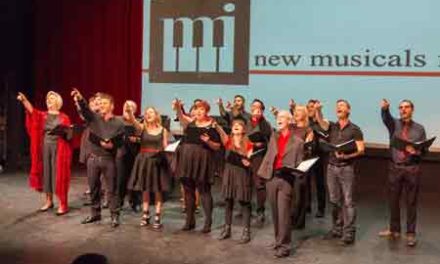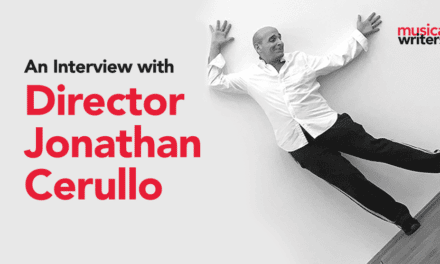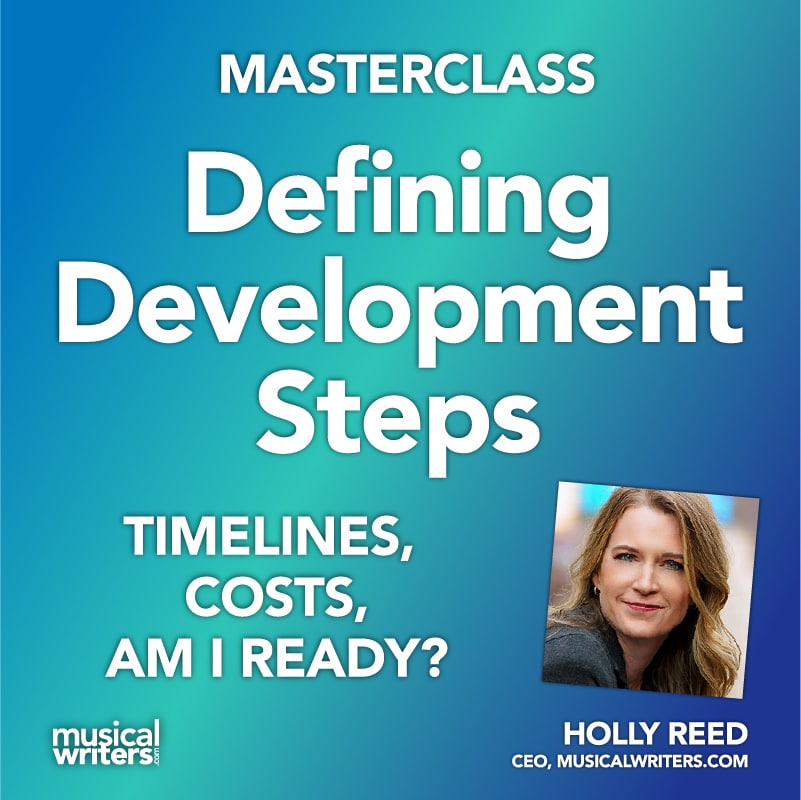If you’ve never done a 29-hour reading, you may not be aware that it takes a great team to execute one successfully. Here’s a breakdown of the roles and responsibilities of the creative team for our 29-hour reading at the York Theatre. This is also the order in which they came on board.
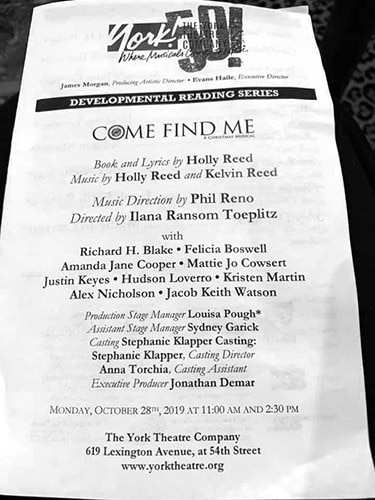
Program for Come Find Me – A Christmas Musical at the York Theatre in October 2019
Executive Producer
An Executive Producer focuses on the day-to-day operations of the show. Our Executive Producer (Jonathan Demar) did the hiring of everyone else on the team (with our approval). He was responsible for the budget, securing rehearsal space, communications with the theatre, coordinating marketing and press releases, inviting industry reps, and determining what our next steps should be following the reading.
In a blog post explaining the difference between various producer roles, Ken Davenport states, “While Executive Producers are “hired guns” for Broadway shows, a good one pays for himself, herself, or themselves several times over, by either saving the company money or making the company money through financial efficiencies, and/or by providing creative ideas (in the marketing, in the dramaturgy, etc.) that have a positive impact on the production itself for years to come.”1
Director
Our Director (Ilana Ransom Toeplitz) was our ultimate go-to and the creative head of the team. She and I had the most intimate working relationship, as we spent many hours in development before the 29-hours began. She offered insight, wisdom, and fresh ideas regarding character arcs and motivations, song placement, scene placement, show pacing, and accurate tracking of story pieces. Ilana was highly respectful of us creatively, which I found extremely comforting. She did not hesitate to dig in to difficult conversations, but always delivered critique with kindness and utmost respect. We gave our Director full permission to suggest changes as needed, even up through the day of performances (we cut a song from Act 1 for the second performance of the reading!). The Director also sets the emotional and professional temperature of the rehearsal—which in our case, was always warm, safe, playful and wonderful.
Ilana explains, “As a Director of a 29-hour reading, my role is to clean and polish the bare bones of the show with the writers in pursuit of the cleanest, most interesting and honest story. Then, I manage and organize the rehearsal process in tandem with the stage manager, music director and producer. After we work with a casting director to find the cast that supports the story we want to tell, I get into rehearsals while I tell that story on how to stand up on its strongest pair of legs (and music stands) in front of an audience. I never stop editing the script with the writers. My job is to develop the show into its best life on the page with the writers and then bring each actor to their best performance — I feel a responsibility to bring the best out of my collaborators.”
Music Director
The Music Director assumes multiple roles, including teacher, conductor, performer and advisor. Our wonderful Music Director (Phil Reno) patiently plunked out notes to teach the cast their songs, transposed music to better accommodate vocal ranges (on the fly), made suggestions on harmonies and vocal arrangements, and coordinated and rehearsed the band. Not to mention was brilliant on the keys.
In a 29-hour reading, there is no staging, costumes, or props. To help the audience follow the settings and action of the story, we hired an additional actor to read abbreviated stage directions. Obviously, the music wasn’t written to accommodate stage directions read inside the songs. Our Music Director improvised or vamped music when necessary to keep the show flowing and seamless. We also ended up cutting half of the Finale and ending the number halfway through at an appropriate “ending”-feeling point. However, this was right before a shift in the music and didn’t feel like a complete ending. Phil masterfully added a run and button to wrap the show perfectly.
In this Playbill article, Music Director Andrea Grody (Tootsie) explains that the [Musical Director’s] “job is to execute the musical piece of that story in accordance with [the] composer-lyricist’s vision.” 2 Hamilton Music Director Alex Lacamoire (Hamilton) gives these tips to Keyboard online readers: “Your biggest duties are to serve the composer and the story that’s being told onstage. Have you done everything in your power to make the composer’s music shine as brightly as it can?3
Casting Director (and Assistant)
Our Casting Director (Stephanie Klapper) was a huge facilitator in setting us up for success. At our Director’s suggestion, several weeks before casting we (the writers) came up with a “Dream Cast” for the show and created a thorough description of each character (beyond the basic description in the script). The Dream Cast was definitely a fun exercise for us (hello, Hugh Jackman!). This helped the Casting team get a vision of what we were looking for. They searched high and low to find the best candidates for the job and—under a pretty tight time constraint—found us a stellar group of actors. Casting requires patience; there is a long game of “telephone” from the writer to the actor when you’re doing in an “offer” process and not auditions. The Writers suggest an Actor to the Director, who approves or suggests an alternative. That goes to the Casting Director, who has to find the Actor’s Agent. The Agent gets with the Actor on their availability and interest. That information is relayed back up the chain, and then back down with the offer. That takes some time, so figure that into your preparations.
Stephanie shares her thoughts on her role: “A Casting Director is an integral member of your design team. We work with the creative team to design the cast – we are the conduits to the talent, agents, managers, and those actors who are unrepresented. We are the actor detectives who make discoveries, make lists of actors we would like to suggest that are a good fit for the project, facilitate putting talented performers together to help realize the cast that the creatives have been envisioning. As a casting director it is my job to listen to the creative team’s needs, interpret, and bring suggestions and solutions to the table. We provide ideas, arrange auditions and make the process happen in a creative, exciting and inspiring manner.”
The Casting Assistant (Anna works to support the casting director in putting out calls and emails to set the talent, helping with research, checking availability, and being a great communicator.
Production Stage Manager (and Assistant)
Our Production Stage Manager (Louisa Pough) was the first person waiting for us in the room when we arrived for our first rehearsal. She managed everyone’s schedules, documented the director’s notes and script and music changes, and provided a daily email recap to all involved. Louisa summarized her role as this: “I believe that the role of the stage manager is to be a facilitator of the creative process.”
Our Assistant Stage Manager (Sydney Garick) was a mover and shaker as well. “As the Assistant Stage Manager of a 29-hour reading, my role is to assist the Stage Manager however I can to make the rehearsal room run seamlessly for the rest of the team. That means helping run errands, print out scripts, pick up supplies, or take down script changes as the SM is taking down blocking notes. I also assist on show day with setting up and breaking down stage as well as backstage by making sure that the cast is aware of how long until each act begins and making sure they enter and exit smoothly.”
Start Building Your Connections Today
You may not be ready for a 29-hour reading, but that doesn’t mean you shouldn’t be actively making connections now. As you navigate the journey of getting a show from page to stage, you will undoubtedly discover more and more that building relationships is paramount to almost any other task you’ll face. Because those relationships are what will enable you to do YOUR job better as a writer.
Share your gift, share your presence, and invite others into your world.
Seek out those further down the road than you. Encourage those who are a few steps behind. Be brave and bold and reach out. You’ll spread a wide net for your feet and may be invited into the presence of kings.
Invest in relationships, because that’s what pays off both today and tomorrow.
Footnotes
- https://www.theproducersperspective.com/my_weblog/2019/03/the-three-types-of-broadway-producers-lead-producer-co-producer-and-executive-producer-explained.html.
- http://www.playbill.com/article/theatre-jobs-what-does-a-broadway-music-director-do
- https://www.keyboardmag.com/artists/5-things-alex-lacamoire-has-learned-about-being-a-music-director-on-broadway

